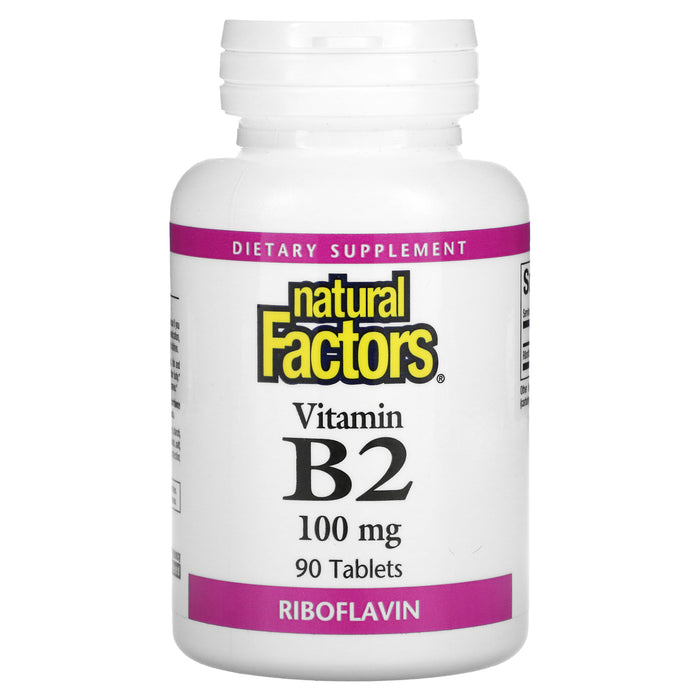




| Serving Size: 1 Tablet | ||
| Servings Per Container: 90 | ||
| Amount Per Serving | % Daily Value | |
| Riboflavin (Vitamin B2) |
100 mg | 7,692% |
Optimize metabolism and energy production with Natural Factors Vitamin B2 (Riboflavin).
Natural Factors Vitamin B2 (Riboflavin) is an essential nutrient that supports the metabolism of carbohydrates, fats, and proteins, contributing to increased energy production in the body. This vegetarian-friendly supplement also helps maintain healthy vision, skin, hair, and mucous membranes.
1 tablet per day or as directed by a health professional.
Microcrystalline cellulose, stearic acid, silica, coating (carbohydrate gum [cellulose], glycerin).
Contains no artificial colors, preservatives, or sweeteners; no dairy, starch, sugar, wheat, gluten, yeast, soy, corn, egg, fish, shellfish, animal products, salt, tree nuts, or GMOs.
Manufactured by Natural Factors to ensure safety and potency in accordance with Good Manufacturing Practices (GMP) of the FDA and Health Canada.
As with any supplement, consult your health professional before use if you are pregnant, breastfeeding, or trying to conceive, or if you are taking medication, have a medical condition, or anticipate a surgery. Keep out of reach of children.
Sealed for your protection. Do not use if seal is broken. For freshness, store in a cool, dry place.
At Health Orchard, we are committed to providing accurate product information and images. However, manufacturers may update their product packaging or ingredients, and these changes may not be immediately reflected on our website. It's possible for products to be shipped with different packaging than what is shown online. For the most accurate and safe use of any product, we advise reading the product's label, warnings, and instructions rather than relying solely on the details provided by Health Orchard.
Vitamin B2 (riboflavin) is essential for energy metabolism, cellular growth, and function. It supports the health of the skin, eyes, and nervous system and plays a role in the metabolism of other B vitamins. Adequate riboflavin intake may also help prevent migraines and cataracts.
Good dietary sources of vitamin B2 include milk, yogurt, eggs, lean meats, leafy green vegetables, and fortified cereals. Almonds, mushrooms, and wild rice are also notable plant-based sources of riboflavin.
Vitamin B2 is a water-soluble vitamin, and excess amounts are generally excreted in the urine. As a result, riboflavin has a low toxicity risk, and adverse effects from high intakes are rare. However, very high doses may cause digestive issues, such as nausea or diarrhea, or lead to a harmless yellow discoloration of the urine.
Vitamin B2 deficiency can lead to various health issues, including:
Populations at higher risk for vitamin B2 deficiency include:
Vitamin B2 deficiency can be treated by increasing the intake of riboflavin-rich foods or through supplementation. The recommended daily allowance (RDA) for riboflavin varies by age and sex, ranging from 0.3 mg for infants to 1.3 mg for adult men. In severe cases of deficiency, higher therapeutic doses may be prescribed under medical supervision.